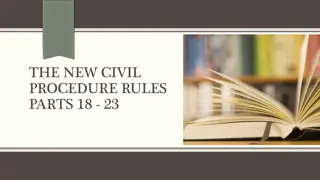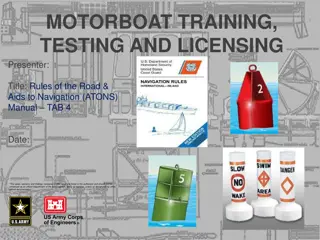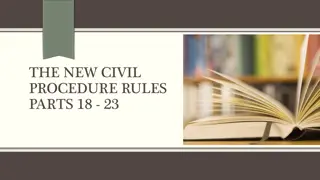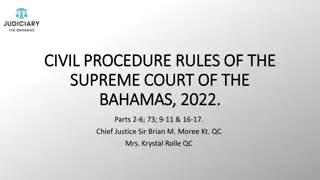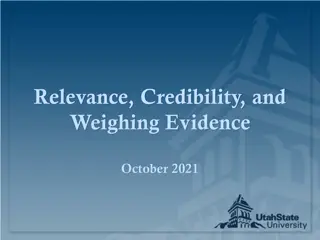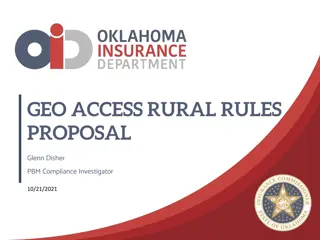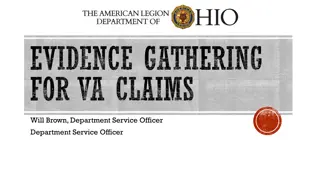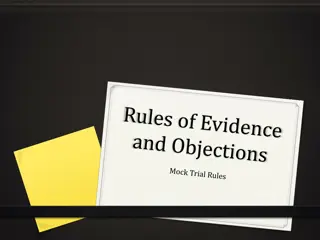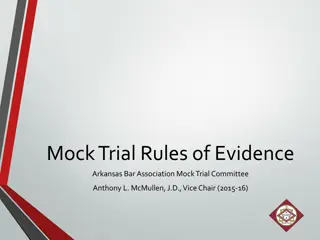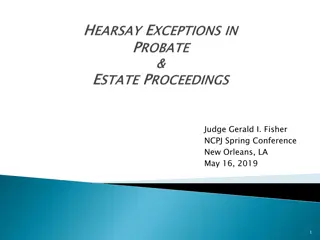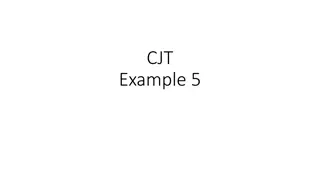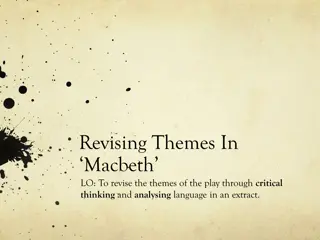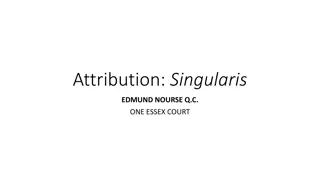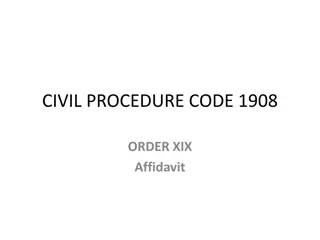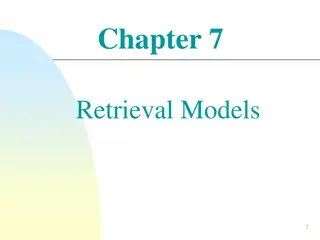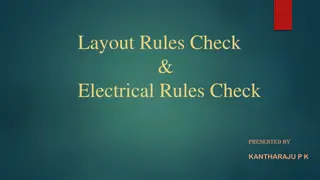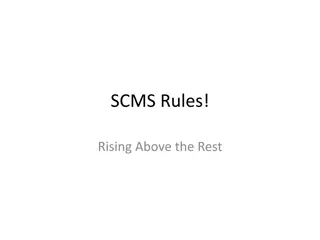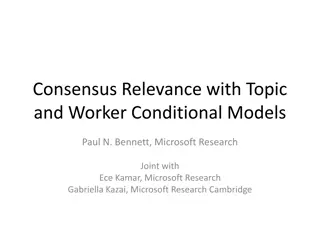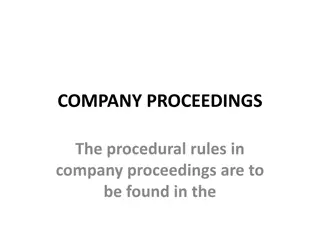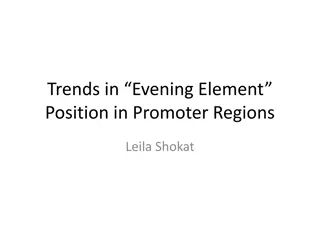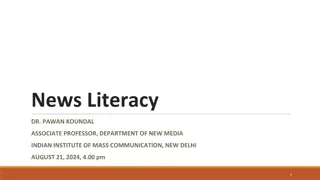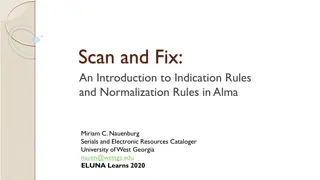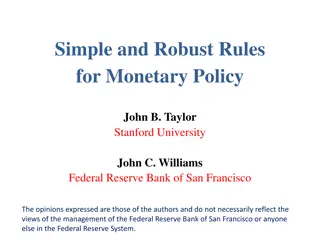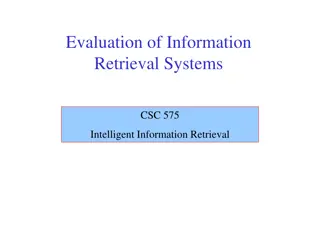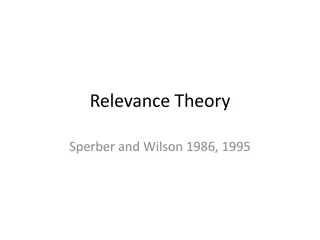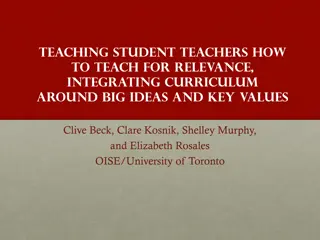Civil Procedure Rules Parts 18-23
The new civil procedure rules cover various aspects such as counterclaims, additional claims, changes to parties, representative parties, miscellaneous rules, and rules regarding minors and patients. The overriding objective is to ensure cases are dealt with justly and at a proportionate cost, consi
2 views • 49 slides
Motorboat Training, testing, and licensing: Rules of the Road & Aids to Navigation Manual
This presentation covers essential information on motorboat training, testing, and licensing, focusing on rules of the road and aids to navigation. It includes details on navigation rules, the importance of following them to prevent accidents, and where the rules apply. The content also explains who
0 views • 34 slides
Gramsci's Political Theory and its Relevance Today
Gramsci's political theory, focusing on concepts such as hegemony, historical bloc, and the role of intellectuals, offers valuable insights into contemporary political challenges. Explored through the lenses of Prof. Ken Spours and Stuart Hall's analytical tradition, this analysis sheds light on Con
0 views • 13 slides
The New Civil Procedure Rules Parts 18-23
The new civil procedure rules cover various aspects like counterclaims, addition of parties, changes to case statements, representative parties, miscellaneous rules about parties, and rules regarding minors and patients. The overriding objective is to ensure cases are dealt with justly and at a prop
5 views • 49 slides
Civil Procedure Rules of the Supreme Court of The Bahamas, 2022
The Civil Procedure Rules of the Supreme Court of The Bahamas, 2022 detail the application of CPR to civil proceedings, highlighting exceptions, the Woolf Reforms, and key provisions such as active case management and the overriding objective. The rules also address proceedings commenced before the
2 views • 30 slides
Mastering the CRAAP Test for Evaluating Information Online
Understand the importance of evaluating online information using the CRAAP Test. Developed by the Meriam Library at California State University Chico, this test focuses on Currency, Relevance, Authority, Accuracy, and Purpose. Learn to assess the timeliness, reliability, and relevance of sources to
2 views • 57 slides
Relevance and Limitations of Marx's Capital in Modern Social Theory
Exploring the ongoing relevance of Marx's Capital in contemporary social theory, Gary Herrigel from the Department of Political Science discusses its implications and theoretical considerations. Despite its foundational role, Marx's work also faces practical limitations, such as the challenge of tra
3 views • 14 slides
Attention and Relevance in English PhD Research
Delve into the dynamics of attention and relevance within English research through a comprehensive and structured exploration. Uncover the impact, originality, and unique value of your study amidst existing literature, ultimately aiming to contribute meaningfully to the field. Embrace the challenges
0 views • 11 slides
Global Relevance and Redundancy Optimization in Multi-label Feature Selection
The study focuses on optimizing multi-label feature selection by balancing global relevance and redundancy factors, aiming to enhance the efficiency and accuracy of data analysis. It delves into the challenges posed by information theoretical-based methods and offers insights on overcoming limitatio
0 views • 15 slides
Relevance, Credibility, and Weighing Evidence in Decision-Making
Explore the importance of relevance and credibility in evidence assessment, the role of hearing panels in evaluating evidence fairly, and the responsibilities they hold. Learn about presenting relevant evidence, policy analysis, and identifying irrelevant evidence to ensure a thorough review process
6 views • 32 slides
Financial and Eligibility Rules for EU Cooperation Programmes
Financial and eligibility rules for EU cooperation programmes include details on the first-level control unit, sources of information, hierarchy of rules, overarching eligibility rules, and reporting overview. These rules cover areas such as project activities, expenditure eligibility, procurement r
2 views • 27 slides
Enhancing Curriculum Relevance and Student Engagement in Higher Education
Reviewing and updating academic programmes to ensure curriculum relevance, active student engagement, appropriate assessment strategies, and effective use of technology to support learning. Considerations include international competition, student diversity, technological advancements, student feedb
1 views • 34 slides
Rural Access Compliance Rules Proposal by Glenn Disher - PBM Investigator
Proposal by Glenn Disher, a PBM Compliance Investigator, outlines rules for rural access compliance. The proposal focuses on considering local conditions and enforcing rules for maximum impact. It includes recommendations for zip code rules, compliance mileage rules, and examples of non-compliant ru
0 views • 7 slides
Evidence Gathering for VA Claims with The American Legion Department of Ohio
Evidence is crucial for VA claims, and it can come in various forms such as documents, written statements, photos, and video recordings. The framework for evaluating evidence includes factors like relevance, competence, credibility, and weight. Understanding the types of evidence, forms of relevance
0 views • 14 slides
Relevance Rules in Legal Testimony
Relevant testimony in a legal case is crucial as it can impact the probability of important facts. However, objections related to probative value, unfair prejudice, and confusion of issues can lead to exclusion of evidence or testimony. Unfair prejudice specifically applies to defendants, while char
1 views • 26 slides
Evidence Rules in Legal Proceedings
Evidence rules in legal proceedings serve multiple vital purposes such as ensuring a fair hearing, preventing the waste of time and resources, and excluding unreliable or prejudicial evidence. Various types of questions are discussed, including leading questions, argumentative questions, speculation
0 views • 20 slides
Mock Trial Rules of Evidence
Mock Trial Rules of Evidence are crucial for determining the admissibility of testimony and evidence in a trial setting. Students preparing for cases need to assess evidence admissibility, make timely objections, and be prepared to defend testimony. The rules cover objections, specific objections ty
0 views • 36 slides
Hearsay Rules and Exceptions in Legal Proceedings
Hearsay evidence, which is an out-of-court statement introduced for the truth of its content, is considered less reliable in court due to factors like lack of oath, inability to see demeanour of declarant, and absence of cross-examination. Various historical judgments and legal exceptions allow cert
0 views • 90 slides
Clinical Judgement Test: Research Question Relevance and Study Design Assessment
This document presents a Clinical Judgement Test focusing on the relevance of a research question and the appropriateness of the study design. Candidates are evaluated on their critical review skills and ability to assess both strengths and weaknesses of the research methodology employed. The test a
0 views • 12 slides
Evaluation of PNIN Phase I: Preliminary Results and Research Questions
This article discusses the evaluation of Phase I of the PNIN project, focusing on relevance, coherence, efficacy, impact, and sustainability. It explores the approach, methodology, research questions, and revised Theory of Change. The study aims to assess the performance of PNIN, potential changes n
0 views • 17 slides
Themes in Shakespeare's Macbeth: Critical Analysis and Reflection
Delve into the themes of blood, night, and sleep in Shakespeare's Macbeth through critical thinking and language analysis. Understand the significance of these recurring words in the play, ponder on the universal themes presented, and consider the contextual relevance of Shakespeare's thematic explo
0 views • 16 slides
Company Attribution Rules in Legal Proceedings
Company attribution rules in legal proceedings are outlined, focusing on primary rules found in a company's constitution, general principles of agency, and exceptions where traditional attribution methods may not apply. The interpretation of laws involving companies and the application of specific a
0 views • 7 slides
Affidavits: Rules and Relevance in Legal Proceedings
Affidavits play a crucial role in legal proceedings, especially in matters involving Income Tax authorities. Governed by Order XIX of the CPC 1908, affidavits must adhere to specific rules, such as being confined to provable facts and being sworn before an authorized officer. They are essential for
0 views • 6 slides
Retrieval Models in Information Retrieval
Retrieval models play a crucial role in defining the search process, with various assumptions and ranking algorithms. Relevance, a complex concept, is central to these models, though subject to disagreement. An overview of different retrieval models like Boolean, Vector Space, and Probabilistic Mode
0 views • 56 slides
Layout and Electrical Rules Check by KANTHARAJU P.K.
Layout rules check is essential in preparing masks for fabrication processes to ensure accuracy. Key design rules include minimum width, spacing, enclosure, and extension. Electrical rules checking (ERC) methodology is used to verify design robustness against electronic design rules at schematic and
0 views • 15 slides
School Rules and Expectations at SCMS
This content outlines the rules, expectations, and procedures for students at SCMS, emphasizing responsibility, accountability, and respect. It covers district-wide rules, brave expectations aligned with those rules, common procedures for all students, and specific guidelines for morning routines. T
0 views • 23 slides
Consensus Relevance with Topic and Worker Models
Study focuses on recovering actual relevance of a topic-document pair using noisy predictions from multiple labelers. Various supervised, semi-supervised, and unsupervised approaches are explored. The goal is to obtain a more reliable signal from the crowd or benefit from scale through expert qualit
0 views • 15 slides
Reevaluating the Relevance of Christians in Today's Secular Society
The presentation explores the diminishing relevance of Christians in contemporary society, attributing it to sentimental attachment and the legacy of Constantinianism. It delves into the concept of the Church as "unchurch" and challenges the traditional notions of Christian influence. The evolving r
0 views • 15 slides
Time and Value of Supply in VAT Webinar Series
This course note covers the essential aspects of time and value of supply in relation to VAT rules. It explains key rules that determine when VAT must be accounted for and paid, focusing on important regulations impacting vendors. Topics include general time of supply rules, rules for connected pers
0 views • 44 slides
Procedural Rules in Company Proceedings
Procedural rules governing company proceedings can be found in the Companies Proceeding Rules, Companies Winding-Up Rules, and the Federal High Court (Civil Procedure) Rules. These rules dictate the process for applications, such as Originating Summons, Originating Motion, or Petition under CAMA. Th
1 views • 22 slides
Transforming ChildFund: Solving Brand Challenges in Advocacy Sector
ChildFund, facing challenges as an undifferentiated brand in a competitive advocacy sector, is focusing on distinctiveness, relevance, trust, pervasiveness, and consistency in brand development. By emphasizing relevance and brand attributes, they aim to increase grants, partnerships, and fundraising
1 views • 26 slides
Privacy and New Technologies: Questions on Personal Data Relevance and Regulation
Explore the relevance of personal data in today's technology-driven world, questioning its impact on privacy and regulation. Delve into the challenges of regulating data gathering, access, and usage while considering the evolving landscape of privacy responsibilities in product development.
0 views • 9 slides
Biologically Important Evening Element in Promoter Regions: Insights from Research by Leila Shokat
The research explores the significance of the Evening Element as a motif in gene promoter regions regulated by CCA1. Understanding the importance of motif positions in promoters reveals insights into gene regulation and biological relevance. The study highlights the relevance of consistent motif pos
0 views • 6 slides
The Characteristics of News and News Literacy
News plays a vital role in informing, shaping opinions, and influencing decision-making. This article explores the characteristics of news including objectivity, timeliness, relevance, proximity, and impact. Objectivity ensures unbiased reporting, timeliness focuses on recent events, relevance targe
0 views • 35 slides
Scan and Fix: Indication and Normalization Rules in Alma
Introduction to indication rules and normalization rules in Alma Miriam C. Nauenburg's presentation on the scan and fix workflow. Learn about creating and applying indication and normalization rules, testing rules in the Metadata Editor, and organizing rules as private or shared.
0 views • 54 slides
Simple and Robust Rules for Monetary Policy Overview
This document discusses the historical background, empirical experience, characteristics of simple rules, robustness, and the comparison between optimal control and simple rules in monetary policy. It explores the evolution of policy rules from Smith and Ricardo to modern approaches, emphasizing the
0 views • 22 slides
Capacity Allocation Mechanisms (CAM) Business Rules Workshop Summary
This summary provides insights into the Capacity Allocation Mechanisms (CAM) Business Rules Workshop held at Ashling Hotel, Dublin on July 2, 2014. The workshop covered topics such as CAM business rules scope, key features, auction processes, code modifications, implementation timelines, and consult
1 views • 32 slides
Evaluation of Information Retrieval Systems and User Satisfaction
Information Retrieval Systems are evaluated based on aspects like query assistance, speed, resources, and relevancy. Measuring user satisfaction often relies on the relevance of search results, which requires benchmark collections, query suites, and binary relevance assessments. Human-labeled corpor
0 views • 24 slides
Relevance Theory: Sperber and Wilson's Approach
Relevance Theory, introduced by Sperber and Wilson in 1986, aims to explain how propositions are understood without relying on mutual knowledge. It addresses deixis, ellipsis, vagueness, and ambiguity while exploring implicatures and providing a general theory of communication beyond just verbal int
0 views • 38 slides
Teaching Student Teachers for Relevance & Integration
Explore how teachers can integrate curriculum around big ideas and key values to teach for relevance. Learn about the findings of a longitudinal study on teacher practices and the importance of balancing traditional content with real-world understanding. Discover the significance of integrating teac
0 views • 18 slides
